

The Washington Consensus. The labor market is not self-regulating; governments must support worker's fight for higher wages. Pt 2.
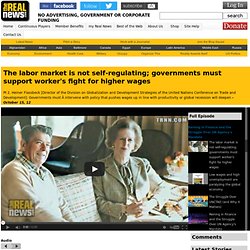
Heiner Flassbeck [Director of the Division on Globalization and Development Strategies of the United Nations Conference on Trade and Development]: Governments must  intervene with policy that pushes wages up in line with productivity or global recession will deepen - Bio Professor Dr. Heiner Flassbeck Graduated in April 1976 in economics from Saarland University, Germany, concentrating on money and credit, business cycle theory and general philosophy of science; obtained a Ph.D. in Economics from the Free University, Berlin, Germany in July 1987. 2005 he was appointed honorary professor at the University of Hamburg.
Worked at UNCTAD since 2000; from 2003 to December 2012 he was Director of the Division on Globalisation and Development Strategies. Transcript PAUL JAY, SENIOR EDITOR, TRNN: Welcome to The Real News Network. End DISCLAIMER: Please note that transcripts for The Real News Network are typed from a recording of the program. Comments. IFIs... There Is No Invisible Hand - Jonathan Schlefer. By Jonathan Schlefer | 10:06 AM April 10, 2012 One of the best-kept secrets in economics is that there is no case for the invisible hand.

After more than a century trying to prove the opposite, economic theorists investigating the matter finally concluded in the 1970s that there is no reason to believe markets are led, as if by an invisible hand, to an optimal equilibrium — or any equilibrium at all. But the message never got through to their supposedly practical colleagues who so eagerly push advice about almost anything. Most never even heard what the theorists said, or else resolutely ignored it. Neoliberalism - perspectives...
The politics and economics of Austerity. Debating the future of capitalism - perspectives... Freedom versus free markets - macrobusiness.com.au. Probably the most wicked intellectual subterfuge of the last three decades — and goodness knows there have been many — has been the pretence that democracy and markets are two sides of the same coin. Both have been extolled under the banner of “liberty”. “Free markets” are somehow the hallmark of democracy and they should be allowed to roam free, untrammeled by evil governments who never doing anything right. Any number of commentators, coincidentally funded by right wing think tanks, warned us that constraining markets represents an attack on basic freedoms.
Such elision is, of course, rubbish; and in many cases deliberate deceit. In a market one dollar equals one vote. What happened next was extraordinary. This, I would suggest, is real liberty at work. Grantham puts it down to childishness in the political arena, run by a president he calls “President No-Show”. 23 Things They Don't Tell You About Capitalism by Ha-Joon Chang. The world is awash with books that claim to explain the global financial meltdown.
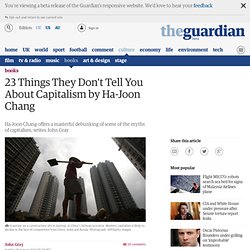
Not many are written by economists. Ignorant of history, including that of economics itself, most economists not only failed to forecast the crash but, mesmerised by the spurious harmonies of their mathematical models, were blind to the mounting instability of the financial system and failed to grasp that an upheaval of the kind that is currently under way was even possible. After an intellectual failure on this scale, what could economists have to say today that would be of any interest to anyone? Anxiously defending their turf, many have objected that they never claimed to predict the future. The Illusion of Free Markets - Bernard E. Harcourt. It is widely believed today that the free market is the best mechanism ever invented to efficiently allocate resources in society.
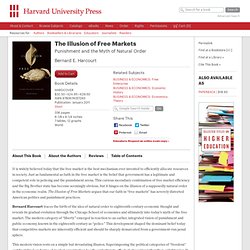
Just as fundamental as faith in the free market is the belief that government has a legitimate and competent role in policing and the punishment arena. This curious incendiary combination of free market efficiency and the Big Brother state has become seemingly obvious, but it hinges on the illusion of a supposedly natural order in the economic realm. The Illusion of Free Markets argues that our faith in “free markets” has severely distorted American politics and punishment practices.
Bernard Harcourt traces the birth of the idea of natural order to eighteenth-century economic thought and reveals its gradual evolution through the Chicago School of economics and ultimately into today’s myth of the free market. This modern vision rests on a simple but devastating illusion. Stranger than Friction. Barry Schwartz argues in this morning’s New York Times that capitalism is all about efficiency, and the problem is that too much efficiency can be a bad thing.
A more profitable company, he says, is a more efficient one, and capitalists are right to pursue profit, but maybe we should slow them down a bit—add some friction to the process. I am reminded of the students I have every year, and there are a lot of them, who just can’t accept the idea that “equilibrium” in a market does not necessarily imply “good”.
You can have equilibrium in a market for slaves, or for nuclear weapons, or simply for your ordinary neighborhood drone. How markets work and whether we are better off because they work that way are two entirely different questions. So also with profit. Why Free-Market Economics is a Fraud. From Ian Fletcher If there’s one thing everyone in America knows, it’s that free-market economics is true and free markets are best. Processed food and coronary capitalism. Frankfurt, Germany - A systematic and broad failure of regulation is the elephant in the room when it comes to reforming today's Western capitalism.

Yes, much has been said about the unhealthy political-regulatory-financial dynamic that led to the global economy's heart attack in 2008 (initiating what Carmen Reinhart and I call "The Second Great Contraction"). But is the problem unique to the financial industry, or does it exemplify a deeper flaw in Western capitalism? Consider the food industry, particularly its sometimes malign influence on nutrition and health. The Jungle, Revisited. The meat would be shoveled into carts, and the man who did the shoveling would not trouble to lift out a rat even when he saw one—there were things that went into the sausage in comparison with which a poisoned rat was a tidbit.

There was no place for the men to wash their hands before they ate their dinner, and so they made a practice of washing them in the water that was to be ladled into the sausage. There were the butt-ends of smoked meat, and the scraps of corned beef, and all the odds and ends of the waste of the plants, that would be dumped into old barrels in the cellar and left there. The End of Loser Liberalism: Making Markets Progressive. By Dean Baker (2011) Progressives need a fundamentally new approach to politics.
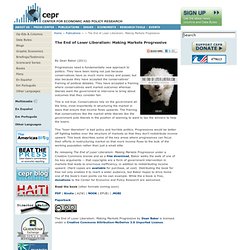
They have been losing not just because conservatives have so much more money and power, but also because they have accepted the conservatives’ framing of political debates. They have accepted a framing where conservatives want market outcomes whereas liberals want the government to intervene to bring about outcomes that they consider fair.
Ayn Rand...? Mind over Market" Michael Spence surprises me by making many of the points about markets I've been trying to emphasize lately (and help making these points is more than welcome), in particular that markets are not very good at addressing stability, distributional equity, and sustainability issues: Mind over Market, by Michael Spence, Commentary, Project Syndicate: In the 66 years since World War II ended, virtually all centrally planned economies have disappeared, largely as a result of inefficiency and low growth.
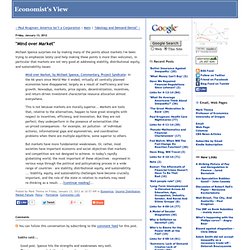
Nowadays, markets, price signals, decentralization, incentives, and return-driven investment characterize resource allocation almost everywhere. This is not because markets are morally superior... Markets are tools that, relative to the alternatives, happen to have great strengths with respect to incentives, efficiency, and innovation. But markets have more fundamental weaknesses. Mind over Market - Michael Spence. Exit from comment view mode.
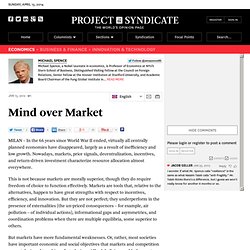
Click to hide this space MILAN – In the 66 years since World War II ended, virtually all centrally planned economies have disappeared, largely as a result of inefficiency and low growth. Nowadays, markets, price signals, decentralization, incentives, and return-driven investment characterize resource allocation almost everywhere. This is not because markets are morally superior, though they do require freedom of choice to function effectively. Markets are tools that, relative to the alternatives, happen to have great strengths with respect to incentives, efficiency, and innovation.
But markets have more fundamental weaknesses. Consider stability. Greenspan's Faith in Markets.
Market failure... Milton Friedman’s Magical Thinking - Dani Rodrik. Exit from comment view mode.
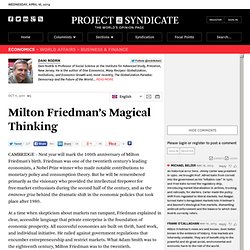
Click to hide this space CAMBRIDGE – Next year will mark the 100th anniversary of Milton Friedman’s birth. Friedman was one of the twentieth century’s leading economists, a Nobel Prize winner who made notable contributions to monetary policy and consumption theory. Jungle Ethics Financialism vs. Free Market Capitalism. Proposals for adequate regulation and enforcement in the financial markets often run into objections from advocates of free-market capitalism. Like any discussion that involves “isms,” a lot of confusion and hard feelings can be generated by a failure to examine the assumptions and preconceptions that cluster around the central conception.
On Short-Termism and the Institutionalization of Rentier Capitalism. Andrew Haldane and Richard Davies of the Bank of England have released a very useful new paper on short-termism in the investment arena. They contend that this problem real and getting worse. This may at first blush seem to be mere official confirmation of most people’s gut instinct.
However, the authors take the critical step of developing some estimates of the severity of the phenomenon, since past efforts to do so are surprisingly scarce. A short-term perspective is tantamount to applying an overly high discount rate to an investment project or similarly, requiring an excessively rapid payback. In corporate capital budgeting settings, the distortions are pronounced: Most recently, in 2011 PriceWaterhouseCoopers conducted a survey of FTSE-100 and 250 executives, the majority of which chose a low return option sooner (£250,000 tomorrow) rather than a high return later (£450,000 in 3 years). Short-termism and the risk of another financial crisis.
The Myth of the Free-Market American Health Care System - Megan McArdle - Business. What the rest of the world can teach conservatives -- and all Americans -- about socialism, health care, and the path toward more affordable insurance. The Ideological Crisis of Western Capitalism - Joseph E. Stiglitz. Exit from comment view mode. Click to hide this space. Economics in Crisis by J. Bradford DeLong. Exit from comment view mode. Click to hide this space BERKELEY – The most interesting moment at a recent conference held in Bretton Woods, New Hampshire – site of the 1945 conference that created today’s global economic architecture – came when Financial Times columnist Martin Wolf quizzed former United States Treasury Secretary Larry Summers, President Barack Obama’s ex-assistant for economic policy. "[Doesn’t] what has happened in the past few years,” Wolf asked, “simply suggest that [academic] economists did not understand what was going on?”